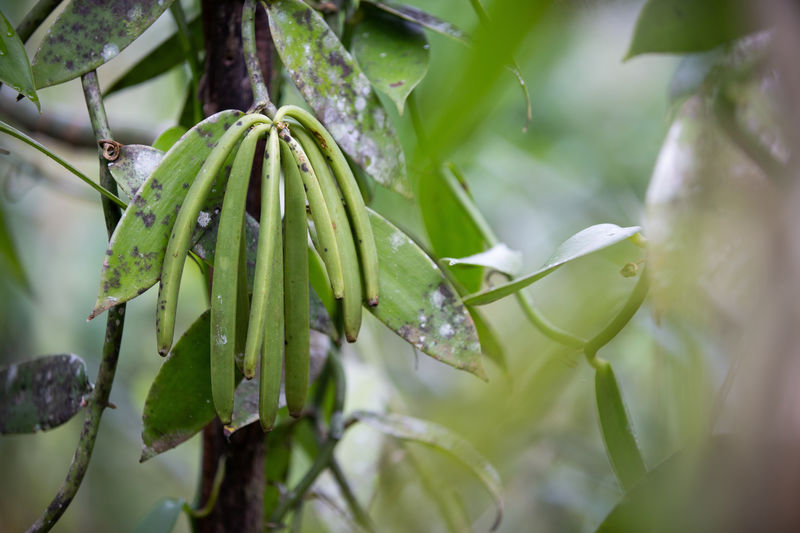By Lovasoa Rabary and Hereward Holland
MAROVATO, Madagascar (Reuters) - Rocketing vanilla prices bought Madagascan farmer Berlin Ranary a hot pink sofa, a motorbike - and a double-barreled shotgun to protect his crop.
Thieves have stolen almost 20kg of his 200kg harvest this year, part of a crime wave washing over the East African island nation of Madagascar.
Competition for the high-priced beans has sparked violence between vigilante farmers and thieves - and a precipitate drop in the quality of the crop.
Unripe beans - stolen from the vine or picked early by farmers fearing thieves - have much lower levels of vanillin, the compound that gives the spice its aroma and acts as a natural preservative.
The vanillin in Madagascar beans on the open market has halved to 1.2-1.3% over the last five years, said Germany-based flavor producer Symrise (DE:SY1G), which counts Unilever (L:ULVR), owner of Ben & Jerry's and Magnum ice-cream brands, among its clients.
Global demand for vanilla is so insatiable, however, that the dwindling quality has had little effect on price, although big buyers now try to avoid buying on the open market.
Over the same five years, the wholesale price of the bean has soared nearly 500%, making it the second most expensive spice on the planet after saffron and worth more per kilo than silver.
The scramble for riches often ends in blood.
FEARFUL HARVEST
Ranary's fields lie on the verdant mist-wreathed slopes in northern Madagascar, where around two-thirds of the world's vanilla is grown.
His harvest, when blanched and sun-dried, will produce 33 kg of black vanilla, worth around $5,700 on the local market, more than 10 times the average income in Madagascar. The crop pays his four daughters' school fees.
So Ranary totes his rusted shotgun - its barrels engraved with a delicate floral pattern - as he patrols his vines with a group of other vigilantes from February to July. The guards rest fitfully in flimsy forest huts between shifts.
"We do not sleep. We are barely eating. Mosquitoes bite us. My body is tired," he said, holding a section of bare vine from which thieves plucked three kilos of green vanilla a week ago.
Some weary farmers, fearing thieves, harvest weeks or even months before the government's agreed date of July 15 - far before the beans are ready.
In addition to lower vanillin, clandestine vanilla-curing by thieves and impatient farmers also upsets moisture content. Endemic corruption makes it hard to stop inferior beans being sold.
"When gendarmes seize green vanilla or catch people selling vanilla before the season starts, they pay off the gendarmes and are released," said Colonel Hajatiana Ralaikoto, head of the gendarmes in the northern Sava region.
Officials estimate thieves pilfered 10% of last year's harvest. This season it's worse: Ralaikoto has arrested twice as many people and seized almost 50% more green and black vanilla pods.
Since 2014, international buyers have rejected a significant quantity of beans because shipments were contaminated with unripe or rotten beans, said Samuel Sabotsy, the governor of Sava. Madagascar authorities and buyers refused to disclose how much vanilla had been rejected.
Buyers like Symrise and suppliers to companies like Nestle (S:NESN) say they are now working with specific farmers to ensure quality.
"We are conscious of the issues affecting the vanilla industry and local communities in Madagascar," a Nestle spokesman said. "Almost 100% of our vanilla is traceable back to specific vanilla orchards."
PRICE SPIKE
In mid-June, weeks before the official harvest in Madagascar, vanilla pods hang from the orchid vine like green fingers.
The pods are so expensive partly because the flowers must be painstakingly pollinated by hand if they grow outside their native areas of South America.
Vanilla cultivation has exploded as increasingly taste-conscious consumers demand natural ingredients and due to more stringent labeling laws which must state "vanilla-flavored" not "vanilla" if real vanilla is not used in a product.
As demand rose, cyclones in back-to-back years battered Madagascar, wrecking vines and sending prices rocketing.
The crop is also used to launder money, said Sava governor Sabotsy. Valuable rosewood logs illegally felled and exported to China have created a massive surplus of local currency. The loggers use vanilla to launder their profits, propelling demand ever higher, he said.Across the region, thatched huts are giving way to small concrete palaces, replete with faux-grecian pillars.
Around 100,000 formerly impoverished farmers have ridden the wave, splashing cash on motorcycles, 52-inch TVs, and solar power systems.
In the regional capital Sambava, a melting pot for farmers, brokers and exporters, the rain-swept streets throb with tuk-tuks jostling with high-end 4x4s, particularly the $50,000 Toyota Land Cruiser favored by brokers.
"If you own it, it’s a sign that you’ve made it," said car dealership owner Raoul Ahmadaly approvingly.
THEFT AND MURDER
Madagascar is one of the world's poorest countries. Many desperate citizens are willing to take on the armed farmers.
The authorities did not want to disclose the number of deaths due to vanilla, but there are many anecdotes about clashes over the crop.
In the latest violence, two men crept into a small vanilla plantation in the village of Befingotra around midnight on Saturday June 15, said Nirina Razafimampiandra, head of the Andapa town gendarmerie.
The thieves attacked with their long-handled machetes, known locally as antsy lavas. As two men guarding their field fought back, one of the thieves escaped into the darkness. His partner took a blow that sliced off two fingers, then a blow to the face, according to the incident report.

He died in hospital that afternoon.